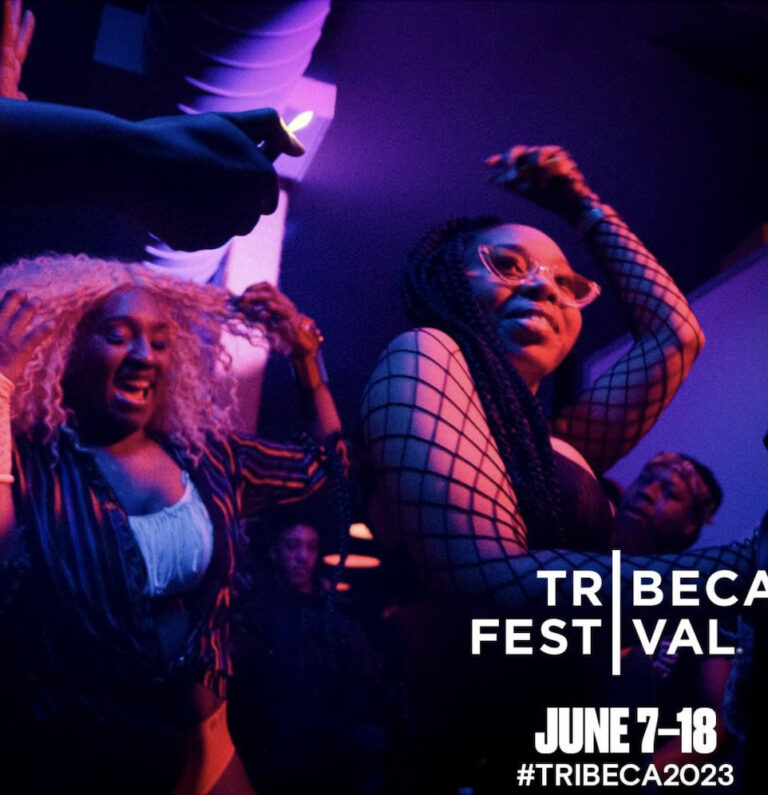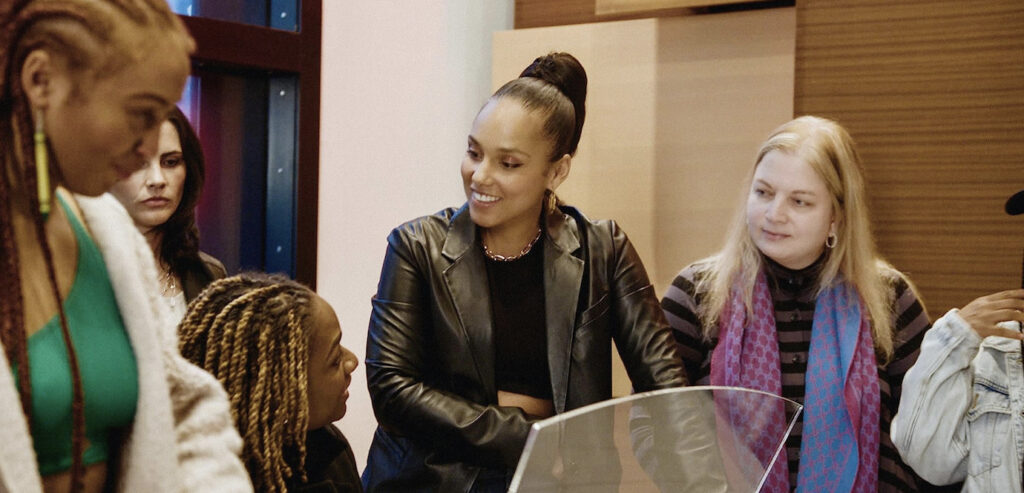
Possessing the talent and drive to succeed, but not having the opportunity they need to be seen, is an unfortunate reality for many artists, especially those who are women. Filmmaker Beth Aala is one such artist who dedicatedly takes on many roles in order to get her projects noticed. She passionately chronicles the challenges that many female artists like she face to be recognized in her new music documentary, Uncharted.
Aala directed and produced the movie, which was made with the help of production company Everywoman Studios. Fifteen-time Grammy-winning singer-songwriter, Alicia Keys and Emmy-nominated news anchor, Katie Couric served as executive producers on the film.
Uncharted takes viewers behind the scenes of Keys’ She Is The Music songwriting camp as it explores the lack of access and opportunity granted to young Black and brown women in the music business. The camp’s participants take center stage as they try to break through the industry with the next big hit track.
The musicians include Ayoni, who is from Barbados and is following in Rihanna’s footsteps. Atlanta’s DaVionne received a break while collaborating with known artists and is now working on her writing and recording. Chicago-born Jean Deaux writes, records and produces tunes all on her own while touring with successful acts.
The audience is taken on a journey with the young women — from performing on the road to intimate sessions at the camp to working with professional mentors, including Keys — as they share their ambitions and challenges. Along the way, the Fallin’ singer shares her own struggles in the music industry, as well as her dedication to working with and championing opportunities for women in music to help them succeed.
Uncharted had its World Premiere on June 10 in the Spotlight+ section at the 2023 Tribeca Festival. Aala generously took the time a few days after the documentary’s first screening at the festival to talk about helming and producing the feature during an exclusive interview over Zoom.

Q: You directed the new music documentary, Uncharted. What inspired you to make the film? How did you approach helming the movie?
BA: Anytime I take on a new film, I have to think about the commitment it takes when you sign up for a project.
With this particular film, it was a female story, and I’ve been telling female stories in the last few films I made. They’re about empowering women, particularly brown and Black women, so that was very meaningful to me.
Ultimately, it was a music-driven documentary, and that’s something I’m very passionate about, as well.
I was immersed in Alicia’s camp once I arrived there, but didn’t really know what the film was going to be about at first. I was just asked to make a film about She Is The Music.
I make character-driven films. So when I met the ladies, I felt it was really important to have a very personal lens to illustrate the issues that they were going through and make them really impactful. I wanted to show what they were going through, including their struggles and challenges.
So to me, that’s the best to connect with an audience. I like to have an intimate, personal lens as a director when I’m talking about big, broad issues.
Q: Like you mentioned, Uncharted focuses on the importance of empowering women, especially minorities. Why do you feel it’s so important to focus on women and minorities in this type of documentary?
BA: I think we’ve made a lot of progress in the documentary film and music spaces. But we still have a lot more work to do, in terms of representing all walks of life, including women.
So the premise of the film is to highlight the issues specifically in the music industry. There was a real need to empower women because the women represented behind the songs were so low. That’s why Alicia formed her organization.
There are a lot of amazing female filmmakers and crew members who worked on this documentary. I was told how unusual it was to have an all-female and brown and Black film crew and team, and that shouldn’t be the case.
It was actually very easy to put together my team because there are a lot of talented women out there. So I think it’s an effort that we all need to be conscious about.
It’s important to include as many voices and artists as possible, and not just the big go-to producers and well-known artists. That’s an issue that we wanted to raise in the music industry, but it also translates into films and documentaries, as well.
Q: Speaking about Alicia Keys, she’s one of several musicians and artists who are featured in the movie. What was the process like of deciding who you would interview and focus on in the film?
BA: The partnership was with Everywoman Studios and Alicia’s music organization. They paved the way for this project to come together. I was brought on, hopefully based on my vérité skills and music background and ability to merge the two, to tell the story and take on the reins.
When we were talking about what was personally meaningful to me about this project, I mentioned that Alicia is obviously such a huge artist and inspiration to me. I love her music and have grown up with her, in terms of my documentary career.
My very first VMAs at MTV was when she performed Fallin‘ in 2001; I was one of the music producers for that show.
So it’s come full circle for me because I started out my career at MTV here in New York and then moved into the documentary space. To then be able to collaborate with Alicia and her organization in this way has been really meaningful.
Having gone to the camp is a whole other aspect. When we started filming, going to the camp was the first time I met all the ladies who are featured in the film. I was immersed in the camp for four days, and I also spoke to some of them over the phone.
But I didn’t have a lot of time to prep, so I was kind of figuring out the story and who the characters were while we were filming. That was super fun, but it was also super challenging to be in the different rooms. I had to try and understand who could carry the story for the rest of the film.
Q: During the production of Uncharted, how did you craft, and decide which of the women’s songs should be included in, its score?
BA: I had the luxury of filming musicians, so I felt it was very important to use their music as their soundtrack. So a lot of the music under DaVionne’s story is actually her original songs, and the same is true with Ayoni and Jean Deaux.
I think the soundtrack had to be all from them, so we used a lot of the songs from the camp. I even used the tracks we weren’t following in the story in the score of the film. So I made it very connective to the camp and the three artists that I featured.
Q: Besides directing the movie, you also served as one of the producers. How did you balance your helming and producing duties throughout the documentary’s production?
BA: I have to say it was very challenging to be the only producer on this film. Usually I have someone in the trenches with me from beginning to end.
On this film, I had a great co-producer in Felicia Stevens, who I’ve known for a long time, from my MTV days. She knows music and is amazing out in the field. She’s also a director, and she has a warm, easy-going personality that would gel with my team and the ladies. So having her on board was really helpful.
I also had the support of Everywoman (Studios). But I also had to wear a lot of hats on this project, not just from the creative standpoint, but also tracking the schedule, managing the budget and making things happen.
Sometimes it was just me and Felicia out in the field, and I was shooting. So it was a very intense production in that regard because producing is very difficult. Typically I would have someone as my partner from the beginning to the end, but we had a unique structure for this film.
Q: Uncharted was edited by M. Watanabe Milmore. How did you two work together to put the final version of the film together?
BA: I actually shoot and edit at the same time. Whenever I direct a film, I always look at my footage at the end of the day, as it informs my next shoot. Of course, I’m there filming, but I still like to review all of the material as I go.
For me, that’s really important in my filmmaking process because it helps me catalog details as they emerge. It helps me remember things as they emerge for storylines that we could follow. So I was actually editing throughout the entire production, from the very beginning to the very end, looking at, and pulling, stuff.
Then Miki Milmore, my main editor, came on board in late fall of last year…We also had a full team of editors rotating and helping shape the story and get scenes down. So we were all hands on deck.
But I had an outline of each character’s storyline developing throughout the shooting process. Then by the time Miki was on board, we had a rough skeleton draft ready for her.
Q: Uncharted had its World Premiere during the Spotlight+ section of this year’s Tribeca Festival. What does it mean to you that the movie premiered at the festival? How did audiences at Tribeca react to the documentary?
BA: I haven’t been to Tribeca in a few years; my last film that played there premiered there close to a decade ago. (Her documentary, Supermensch, about talent manager Shep Gordon, which she also directed and produced, had its New York premiere at the 2014 Tribeca Film Festival.)
So to be back at Tribeca with (Unchained) is incredibly exciting, and we had the most amazing premiere. To be playing in my hometown, and share my film in the city that I’ve lived in for a long time with my colleagues, is amazing.
It’s also exciting to share it with Alicia; this is also her city, as she’s a New York girl, as well. The ladies were also able to play at the premiere. Alicia and Ann Mincieli pulled all the stops and gave our premiere such special treatment.
So all of those things made our premiere at Tribeca so special. It was incredible.

